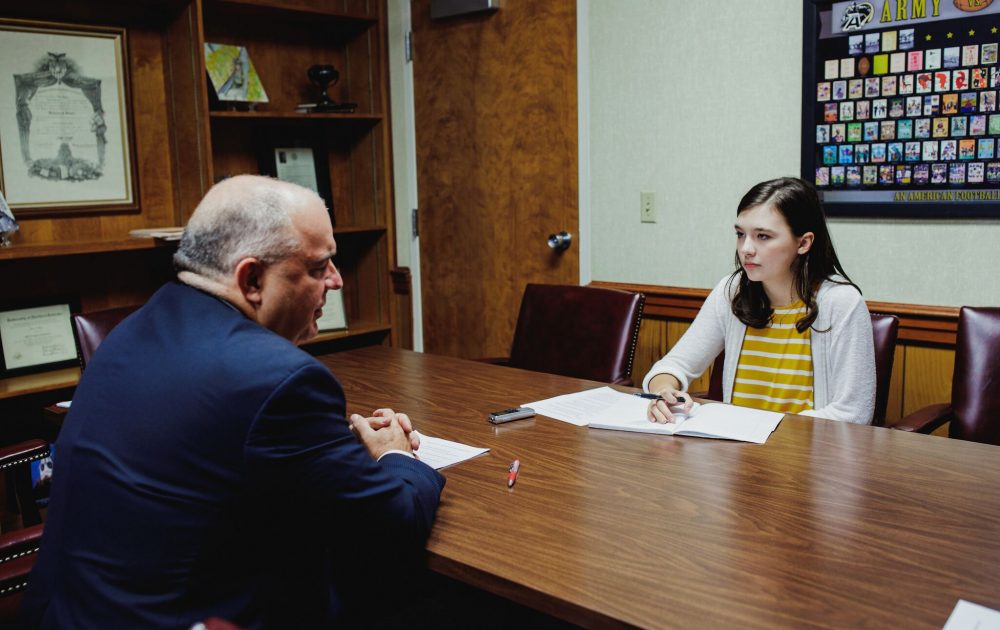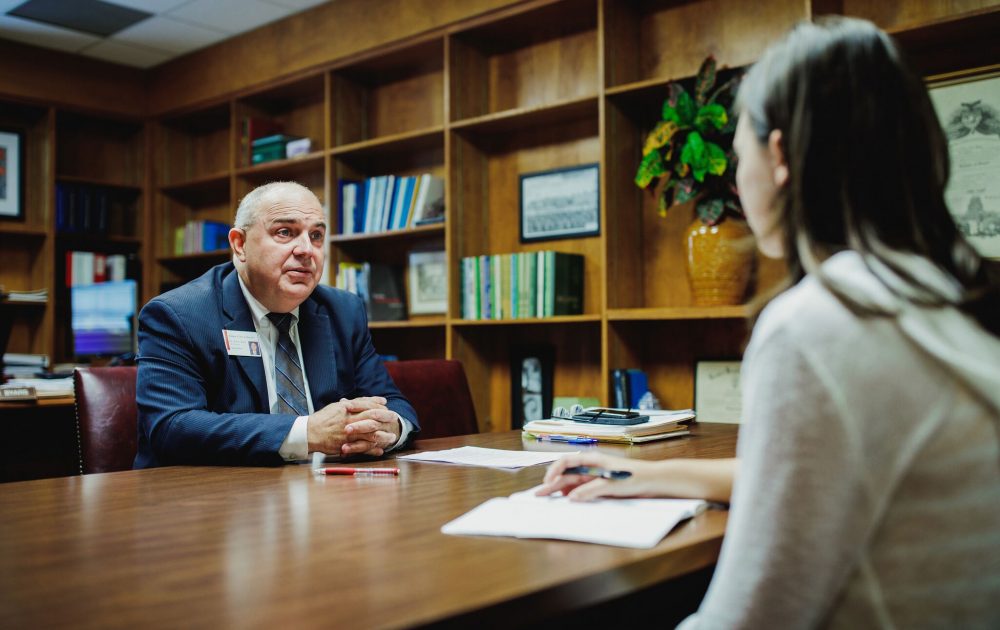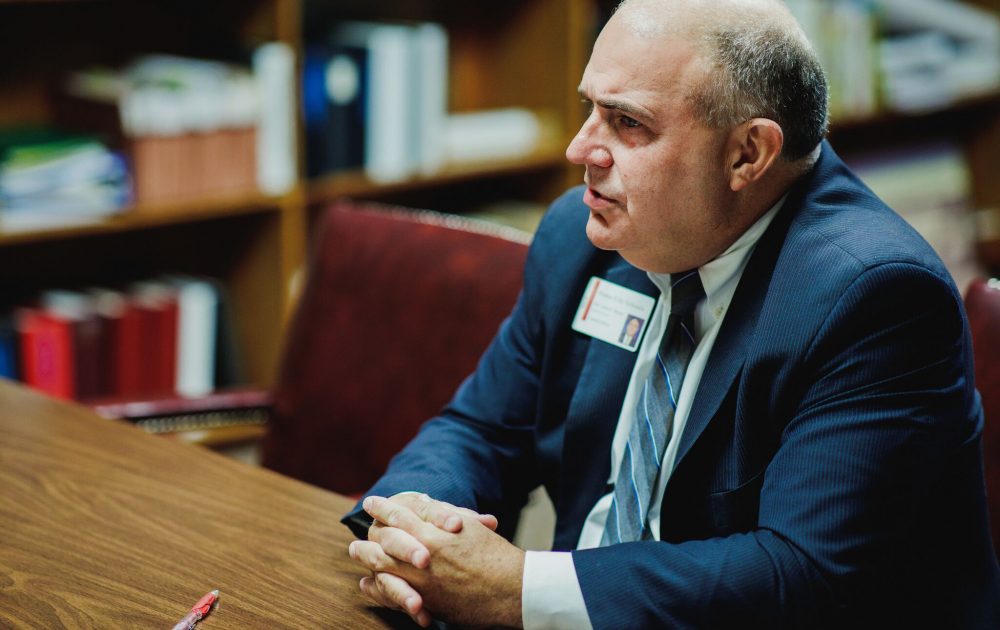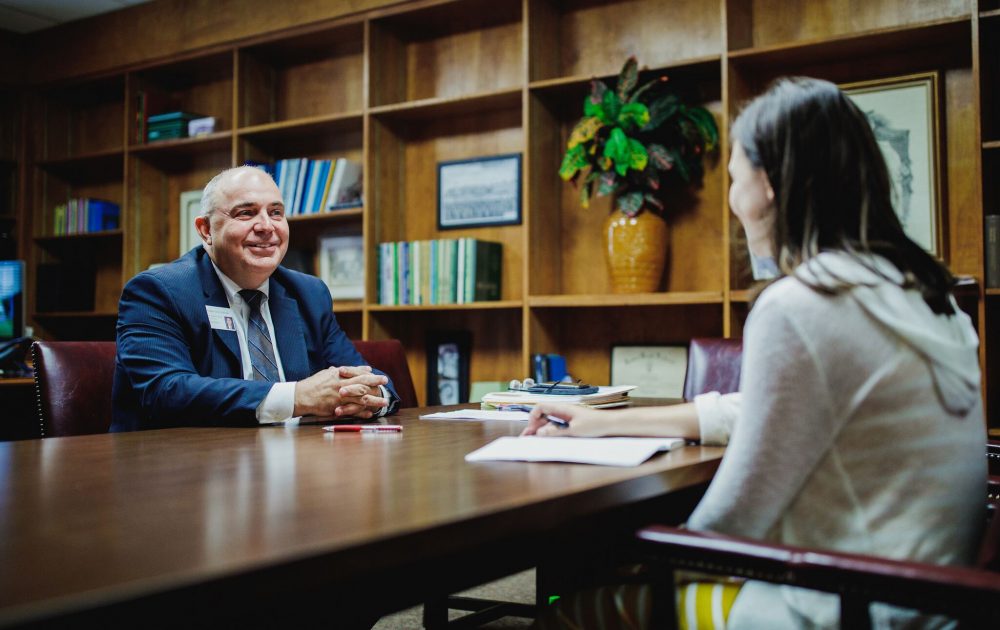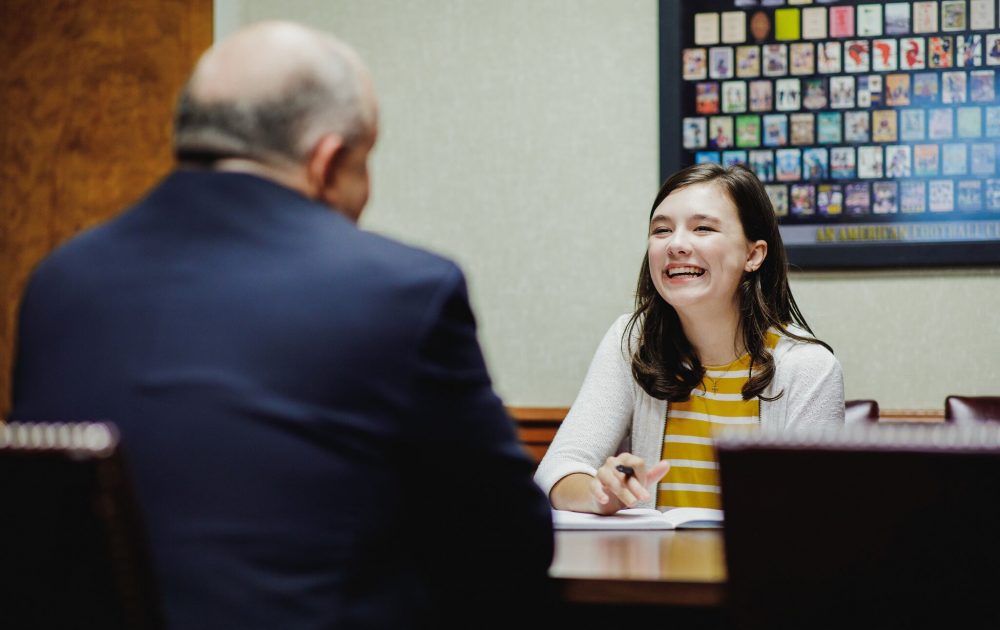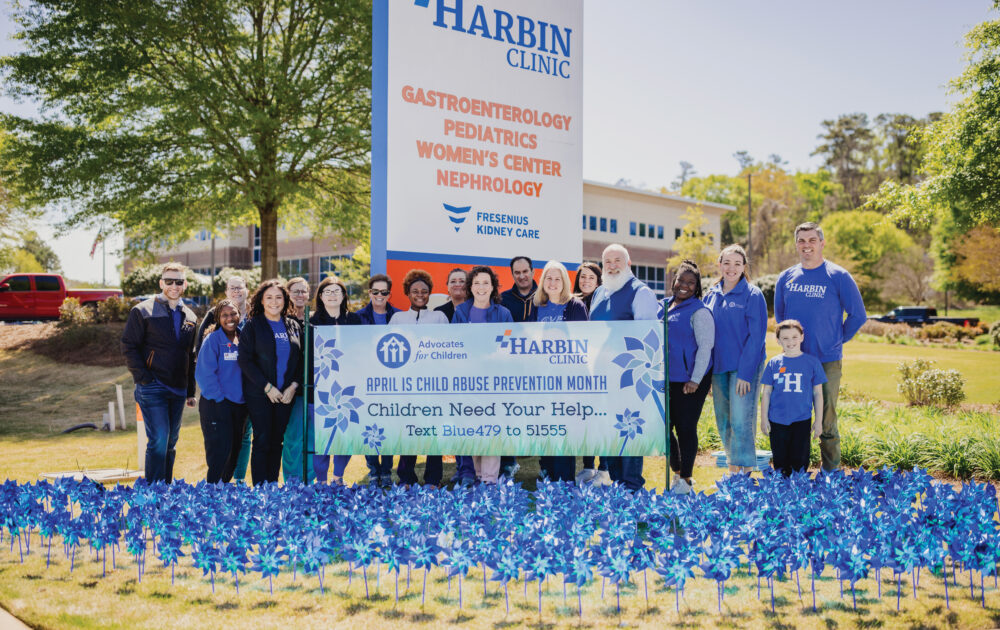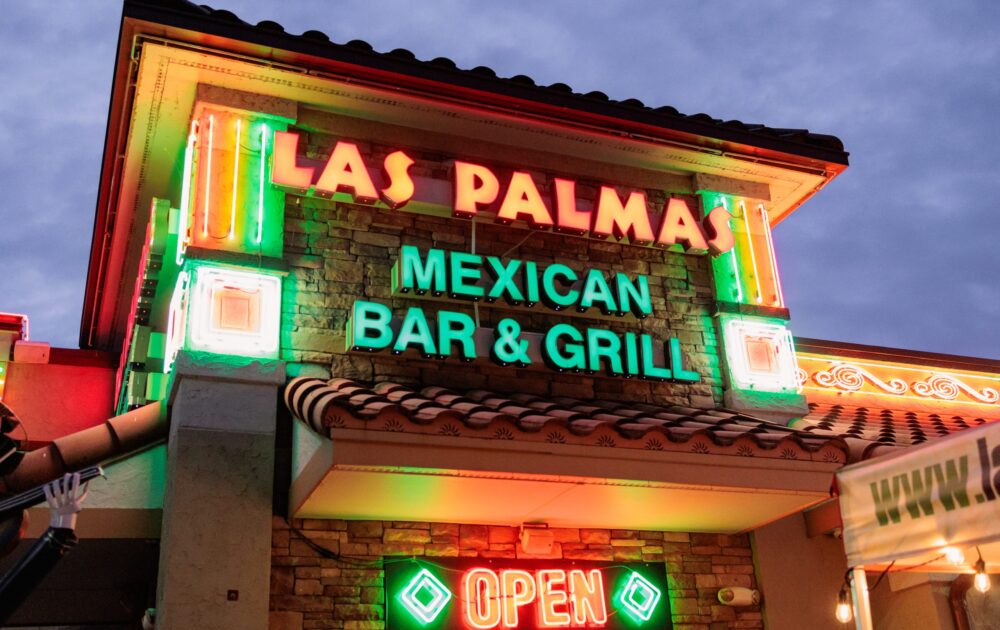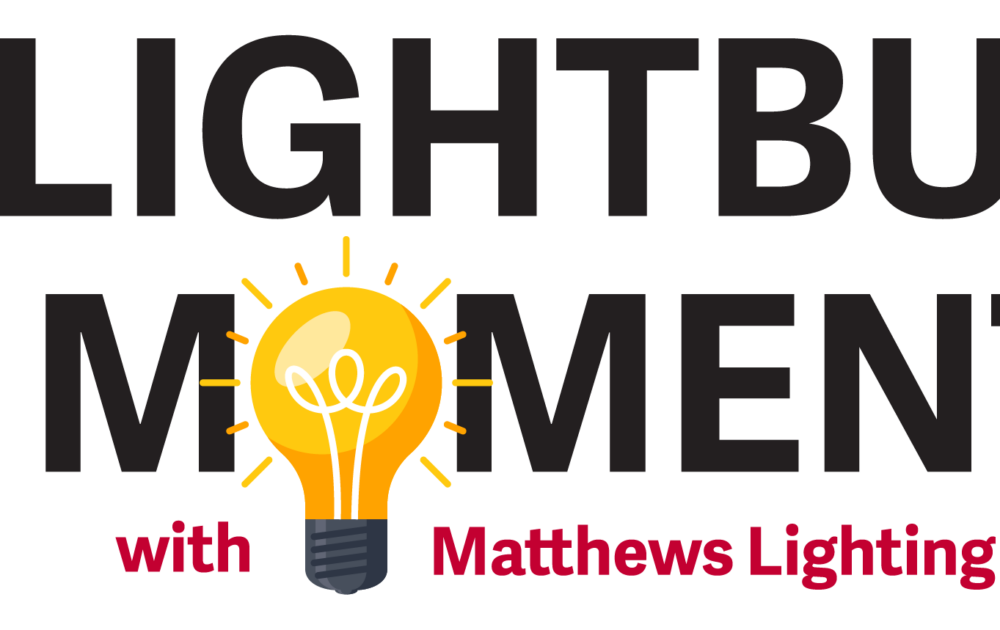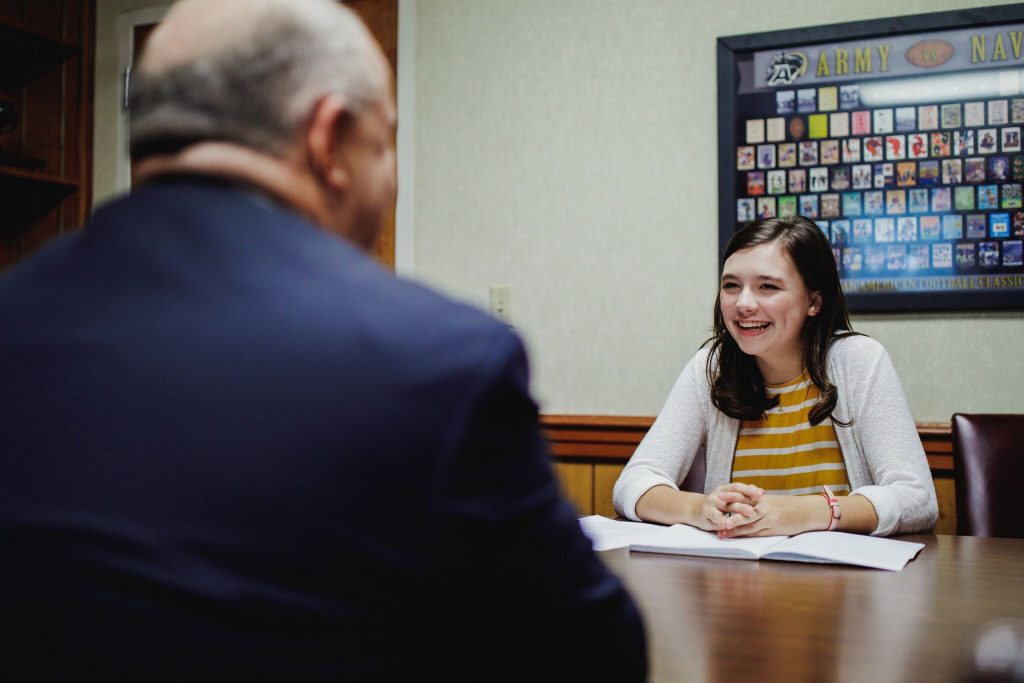
Photos by Rome City Schools
For aspiring journalist and Rome High School freshman, Emma Breithaupt, it is never too early to start. Recently, she completed an internship with V3 where she was introduced to their day-to-day work with a magazine. As an added bonus she got to shake hands and talk with John Bailey, the Executive Editor for the Rome News Tribune, about interviewing techniques. “Don’t go easy on them,” he laughed when giving his key piece of advice.
Her day continued when she got behind the lens with Cameron Flaisch, V3 Executive Photographer, and learned a little about what it takes to make a great photograph. And, perhaps one of the most impactful experiences she had during her time shadowing staff was a chance to interview Louis Byars, Superintendent for Rome City Schools.
Breithaupt was able to draw from her passion for people and for writing to craft questions for Superintendent Byars that were not only meaningful to her, but for her classmates as well. Using her internship as a springboard, she is also working to revive her school newspaper; a paper that will report news from the hallways of Rome High School.
When asked what inspires her, the answer is immediate and sure. “My parents are my biggest influence,” Emma smiled. “I have a few heroes I look up to for examples, but none are as important to how I view the world as my parents.”
Anyone who has spent some time with this brilliant young lady will agree that her folks have done a wonderful job raising her. The sky is the limit for Emma.
See the interview transcript from Emma Breithaupt below:
Emma Breithaupt: So, one of the first questions on my mind was what inspired you to take on this job?
Louis Byars: Well, first of all, it wasn’t something I thought about when I came to work here. I started to work here originally in 2008 in payroll. I went to work for the Department of Education and came back to the school system as a Chief Operations Officer. When Dr. Buck retired, I thought about who I wanted to have as Superintendent. At that time, I wasn’t considering it. However, I’m a lifelong Roman and my family has been in Rome for 100 years. We have always been active in this community, and I realized that I understood what Rome City Schools needed to achieve going forward. So, I applied, and shared my vision for Rome City Schools. Some of those things we are implementing now, like the College and Career Academy at the high school and the Sixth Grade Academy for our school system. So, those are all things that I thought we could improve. That’s what inspired me. I felt like we didn’t have time to let someone new come in and try to learn those things. We needed to continue to move forward.
E: What do you enjoy the most about your job?
B: I love going to the schools, and talking with students and seeing students. I like meetings like the one I am having with you today. That’s my favorite thing when I go to some of the schools; there have been times where I can see myself back then, I won’t say how many years ago, with my friends. I see myself when I was in your shoes. I want to give our students every advantage I can and help them to understand what opportunities they have. That’s what I enjoy the most.
E: I love that. I was on the Leadership Team at RMS, and we all really enjoyed it when you would come and talk with us because it felt like we had a perspective of how things worked in the schools. It felt like we had a voice. We thought that was really great.
B: We are going to try and do more of that this next year with all of the schools. We are trying to get the fifth and sixth graders excited about middle school as well.
E: So, when you were my age, what job did you want to pursue? Did you see yourself becoming anything specific?
B: Well, I’ve always been good at math. Math has just been a natural ability for me since I was young. I can remember as early as the second grade knowing that I was ahead of my peers when it came to math. My father was a civil engineer, my sister was a high school math teacher, and my daughter became a high school math teacher. It’s just a family gift, I guess. With my dad being an engineer, I was starting to look toward engineering as a career. But, I didn’t really know much about it. It was about eighth or ninth grade that I saw an Army vs. Navy football game on TV. I didn’t understand it. I asked my dad, “Are these soldiers out there?” and he explained to me what the military academy was and why it was there. And so it was at that point, I was about your age, when I decided that’s what I wanted to shoot for. I wanted to go to the military academy. There was an engineering school there, and if you got in, there was a full scholarship. So, I started high school pursuing that path. That was the only college I applied to. My family wanted me to apply to others, but I stuck to my dream. That’s where I wanted to go. I started planning my future in the ninth grade.
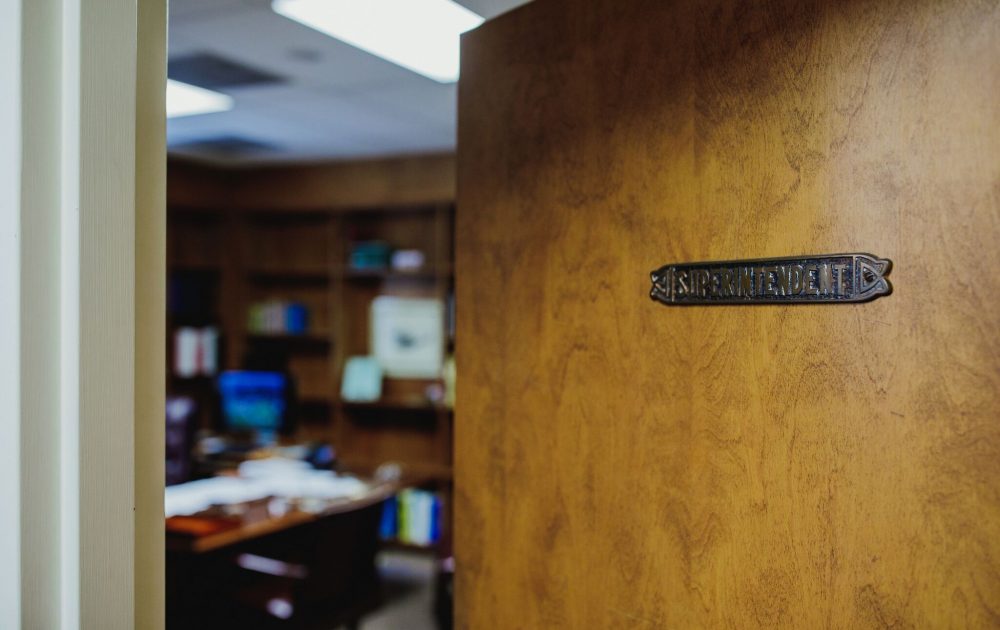
E: Did you learn any important lessons in the military that you still use today?
B: Yes, a couple things. One is integrity and it is very important. You have to be able to trust the person you’re talking to. I learned that, especially at West Point. We have the honor code at West Point. We don’t lie, cheat or steal and we don’t tolerate those who do. We take that very seriously. As a matter of fact, each class had about 36 representatives on the honor committee. I was the representative for my company for my junior and senior years. I was responsible for training all cadets in my company, and we would go through professional learning just like we do now. One of the things I shared with them was that many people always asked me, “Someone just stole five dollars. Why would you kick them out of West Point? Or, why would you ruin their career just because they stole, or cheated on a test?” My answer to that was if you’re willing to risk this great opportunity you have and the scholarship that you have for just five dollars, you’re more than likely going to do something wrong if the decision is much bigger. The smaller the incident, to me, the worse it is. If you were willing to risk everything for five dollars, what are you going to do when someone offers you a million dollars to do something wrong? You’re going to jump at it if you were willing to risk everything for five.
E: Are there any other lessons you learned from the military?
B: Teamwork is another lesson I learned. You’ve got to be able to depend on the people around you. That’s very important in anything you do. I’ve had three different careers. During my military career, I realized that you need to be able to depend on people because whether it’s peacetime or wartime, their lives literally depend on the decisions you make. You don’t forget that. There are no agendas. That’s the one thing I appreciated most. People from all different backgrounds, all different cultures, from all different experiences come together to achieve a common goal. That’s what I’ve tried to do my entire professional career. I try to be a strong leader, whether it’s as an operations person in manufacturing or the military. I was in manufacturing for 20 years and I worked my way up to plant manager. I think the biggest thing I took from the military is how to lead.
E: I think that’s really important, especially because of what you do. It is really important that people work together when trying to solve a problem.
B: Just before you came in, we were planning our meeting for next week. I have principals, assistant principals and central office staff all together. One of the things we’re talking about is trying to build a team atmosphere.
E: So, what are a few challenges that you face while being Superintendent?
B: A few challenges? For me personally, the challenge is seeing how fast we can get to our goals. I think many people want to get results immediately, but it takes time. And the challenge for me is to getting others to understand the process. We focus on graduation rate and we focus on certain things that people can see and quantify, so they can have those immediate results. Those results are measurable. However, the challenge is focusing on birth through five-years-old. Knowing that the results, the things that we’re doing here and now, may not be measured until after I am gone is important. But, I must be prepared to work hard for a child going into kindergarten this year and not graduating for 13 years. So… it takes time. I still need to focus on getting those results.
E: I’m starting Rome High this year and I’m really excited. In what ways will Rome High enhance not just my education, but my fellow students and friends as well?
B: What we are trying to do is address the fact that not everyone is going down the same path. We are giving everyone an opportunity to not only experience and try different things, but also try and figure out where they want to go after high school. Whether that is a four-year college, a two-year college, a certification program, or directly into the workforce, all of our programs can help students be successful. So, how do we help students figure out what they want to do? We want to provide as many opportunities as we can. Our Sixth Grade Academy is going to help our students find their path earlier. Then, we will explain to the middle school students about the different pathways they can choose from in high school. As you move into the high school, you’re going to look back and see more and more of those opportunities added at the middle school, as well. We want to give you all the option to expand and become interested in things outside of the classroom. Whether its band, sports, academic clubs or chorus, we want it to be available for every student. That’s why we added the Grand Finale to the high school.
E: I’ve heard a lot of people really enjoy that.
B: I also think Jr. ROTC I think is a good thing for students to try. If they don’t have anything else that interests them, they can try Jr. ROTC. It’s not meant to send students into the military. I don’t want that misconception, and I think Sgt. Thrash and Col. Whatley are doing a great job of explaining that. It’s about developing character and learning how to be a leader. And I think that program offers a lot, because most of those students will not go into the military. There are a lot of opportunities for you and your friends to experience different things.
E: I heard you talk a little bit about the extracurricular activities, such as Grand Finale, chorus and band. How can I as a student get my classmates motivated to do things like that? How can I encourage them?
B: First, we have to do a good job of making students aware of what’s out there. And, even if they are aware, they’re not going to get involved unless they have an interest in it. You can force people to do things, but that’s not how it works. My advice is to give the students opportunities and educate them as best we can. This is true with everything, including academics, arts and athletics.
E:. What are a few of the processes of implementing the policies that we have in our school system?
B: There are many different ways. The Rome City School Board sets policies; that’s what they do. We will present the policies, which we usually do before school board meetings. The reason we update policies is because the legislature can change some of the laws. Our policies must match the state laws. Now, the Georgia Department of Education will have policies dictating what we have to do. We have to make sure we match what they say and our policies are consistent with the state policies and federal laws. Then, if our Board says, “We want to have more policies that are more locally implemented”, then we can make different policies or we can make present policies stricter. But that’s how we set policies here. Policies are defined, and you’ve got to follow policies. But, we may have procedures, which are similar to policies. Oftentimes, we don’t have the formality of going through the same processes. Generally, those procedures will always be in alignment with our policies. We may make it more detailed in our procedures, but it has to do with the policy. The procedure tells us how we’re going to carry out the policy.
E: RCS is one of the safest school systems around and I’m really glad about that. What ways is the school system making sure that our schools continue to be safe?
B: Great question. Safety has been a big issue. We have been public about some of the things we’re doing because we have been doing these things for years now. Several years ago, GEMA (Georgia Emergency Management Agency) came in and helped us develop our policies and procedures regarding safety. Each school has an outline as to what we’re to do in certain dangerous situations. We’ve been involved with GEMA for a while now. One of the reasons we are rebuilding a new Main Elementary School is because of safety and security.
We are constantly trying to reevaluate our facilities. We have different groups of staff who meet throughout the year to plan. There is a specific facilities group who looks at our facilities and determines how we as a school system can continue to improve. There is a group made up of citizens who attend and give input. People from other organizations such as Berry College will come and help us look at security. We have local law-enforcement, our fire department and many others we meet with regularly to discuss ways of keeping all of our schools safe and improving security measures.
E: Oh, that’s a good idea.
B: We are constantly looking at ways we can continue to make security better. We have an SRO (School Resource Officer) at the middle school and the high school. We hope to have more added to the schools soon. We also have one at the RTA/PLC. Now, being in the city, the police are always nearby. If the schools ever have an emergency, the officers are there quickly.
E: Great. This is my last question. What impact do you personally want to leave on Rome City Schools?
B: I want to be able to leave a foundation, something that will make our school systems stronger. That means improving programs from birth all the way through 12th grade. The College and Career Academy is great and I think it is going to have an immediate impact. I’m really pushing reading on grade level by third grade because that’s very important. That foundation that we are creating with our three-year-old program at Anna K. Davie now is important as well. Working with the Ferst Foundation and our partnership with Floyd Medical Center is also really great for our future. The Ferst Foundation is an organization where a parent can register their child if they are anywhere from 0-5 years old. They will receive a book every month for free until they’re five years old. This is one of the things I am probably as proud about as anything else that we’ve done. Every child that is born at Floyd Medical Center can enroll in this program and gets this wonderful opportunity. Whether they are coming to Rome City Schools or not; it doesn’t matter. Hopefully that will help them in their reading proficiency. We have made that opportunity available to every child that is born. That started January 1, and I know of two or three other schools systems that have tried to look and see how we are addressing literacy. But we were the first to partner with the hospital and the Ferst Foundation to provide this program. That’s one of the things I’m most excited about.
E: I think you are setting up a great start for us all. I mean, this is really special what you’re doing. We all think so.
B: Well, thank you. Having my roots here and my foundation being in Rome City motivates me every day. I’m going to live here and I’m going to retire here. So we want to make sure whether you want to be a doctor or a nurse or whatever position you choose, we have made it possible for you. Because y’all are going to be the ones in 20 years taking care of everything and all of us.
E: Thank you, Mr. Byars! We hope you continue to have faith in us!

